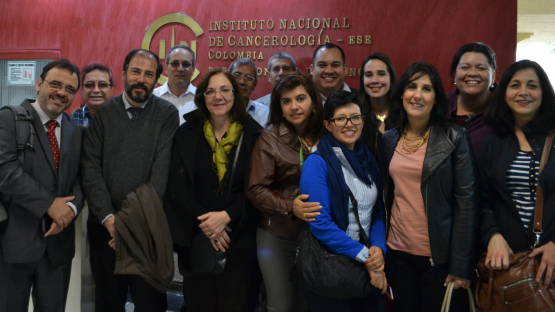Since their initial development in the 1940s, radiopharmaceuticals have been deployed for targeted cancer therapy with great success. This therapeutic technique involves the administration of a radiopharmaceutical, a 'smart' molecule labelled with a radioisotope which emits beta or alpha particles as it decays. Due to their inherent chemical and metabolic attributes, radiopharmaceuticals are able to selectively target cancerous cells, penetrate their membrane and release the energy of the decaying particle to the malignant cell, ultimately destroying it. At present, a variety of therapeutic radiopharmaceuticals already exist and are being used to treat malignancies including non-Hodgkin's' lymphoma, neuroendocrine tumours, metastatic bone disease and hepatocellular carcinoma.
Because radiopharmaceuticals often have a short lifespan, and must be produced close to where they will be used, and in view of the need in the Latin America region to improve access to radiopharmaceuticals, the ARCAL regional project RLA6074, 'Supporting the Development of Regionally Produced Radiopharmaceuticals for Targeted Cancer Therapy through the Sharing of Capabilities and Knowledge, and Improvement of Facilities, Networking and Training', was launched in 2014. This technical cooperation project aims to establish coherent guidelines, best practices and technical protocols which will facilitate the clinical study of radiopharmaceuticals by Latin American Member States to evaluate their efficacy, quality and safety in targeted cancer therapy.
Following the project's first Coordination Meeting-held in Havana, Cuba in February 2014-regional experts have worked diligently to produce 49 state-of-the-art protocols and guidelines for the preparation and quality control of radiopharmaceuticals with yttrium-90, iodine-131 and lutetium-177 as well as for preclinical trials and dosimetry studies.. Workshops have already been organized in Peru, Brazil and Cuba to train 57 specialists from 12 countries on the agreed protocols.
From 13 to 17 July 2015, more than 15 radio-pharmacists, radio-chemists and nuclear medicine physicians attended a Regional Intermediate Project Coordinators Meeting, hosted by the Colombian National Cancer Institute and supported by the IAEA. The meeting reviewed progress in the project, identified lessons to be learnt and gathered feedback on further actions to achieve the project outputs. Delegates attending the meeting represented the 12 Member States participating in the project, namely: Argentina, Brazil, Chile, Colombia, Costa Rica, Cuba, Guatemala, Mexico, Nicaragua, Paraguay, Peru and Uruguay.
In future, further training and networking opportunities will be organized by the participant countries with IAEA support in order to ensure that knowledge generated contributes to the future expansion of radiopharmaceutical applications for targeted cancer therapy.


